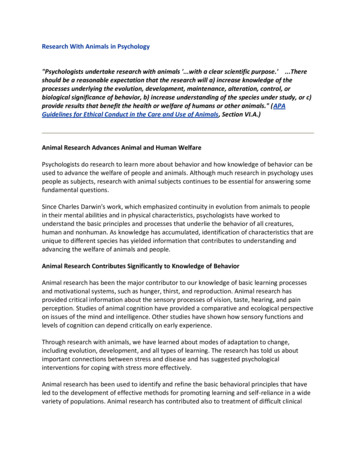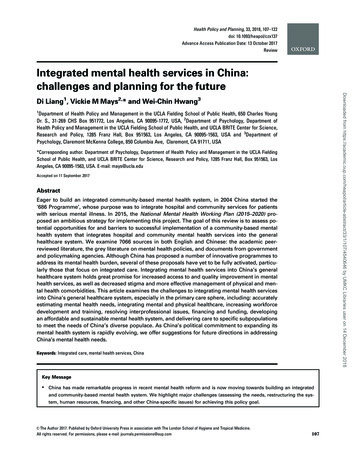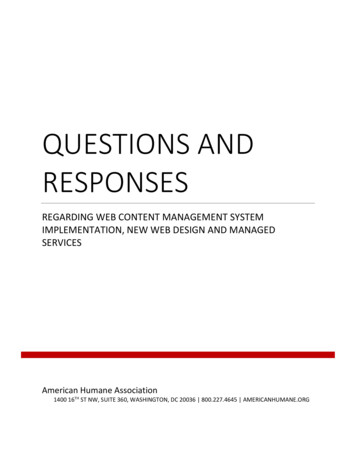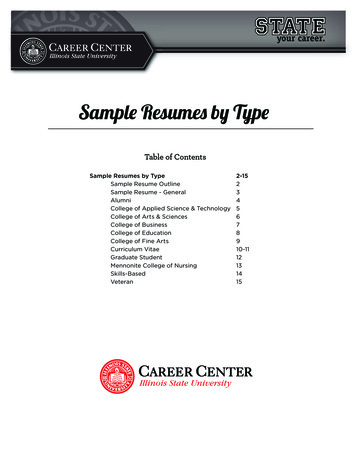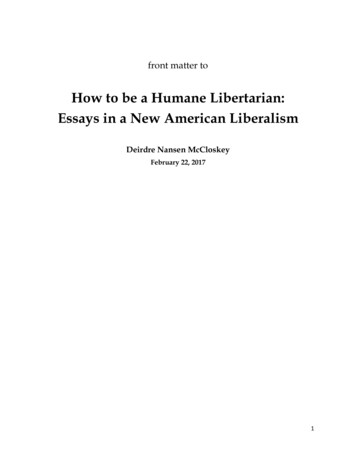
Transcription
front matter toHow to be a Humane Libertarian:Essays in a New American LiberalismDeirdre Nansen McCloskeyFebruary 22, 20171
Table of ContentsPreface[included here below]Part I: Ethics, and Ethical Change, Make Liberalism Work1. Humane liberalism is ethical2. The unethical cannot be repaired by mere laws or economic incentivesPart II.: Humane Liberalism Enriches People Materially3. Liberalism made the United States rich, 1800 to the present, but did not destroy oursouls4. Liberalism was the plan of equality, liberty, and justice5. The liberal plan made the West rich, and now the rest6. Trickle up or down is not how the economy works7. Work and trade are good for you8. The liberal idea, in short, made the modern worldPart III: But People Do Not Live by Bread Alone9. And people don’t live by prudence alone10. Modern life is in fact not especially prudent11. The sacred and the profane intertwine12. Quit worrying about "consumerism"Part IV: Christian Liberalism Liberates13. "Christian liberalism" is not oxymoronic14. "Christian prudence" is not oxymoronic, either15. Some strains of Christianity are anti-economic16. But markets and innovism can fit Christianity17. Being a good Christian won’t hurt the economy2
18. The bourgeoisie, that is, can be goodPart V: A Humane Liberalism is Good for the World19. Liberalism is for Italians20. For Chileans21. For Hungarians22. Even for RussiansPart VI: The Enemies of Liberalism are Mistaken23. The economic sky is not falling24. The West is not declining25. Trade is ancient, not inhuman, and Karl Polanyi got it wrong26. Michael Sandel can’t buy the cooperative character of markets27. Marxism is not the way forward28. Marxians stopped studying economics in about 186729. A post-modern liberal feminism is possible and desirable30. Imperialism was not how the West was enriched31. Liberalism is good for queers32. The minimum wage was designed to damage poor people and women33. Do worry about the environment, but prudentlyPart VII: In Particular, the New Obsessionwith Inequality is Misplaced34. Making people equal is not a true or humane liberalism35. Piketty is mistaken36. Europe should resist egalitarian policies37. Pessimism about market societies is not scientifically justified38. The rich do not in a liberal society get richer at the expense of the rest39. Piketty's book has serious technical errors40. Inequality is not unethical if achieved in a liberal society41. Redistribution doesn't work3
Part VIII: Ethics Matters, Facts Matter, Rhetoric Mattersto a Humane Liberalism42. Liberalism, to repeat, can’t be a-ethical43. Nor can liberalism be fact free44. Free speech supports a free economy, and vice versa45. Rhetoric is not merely bullshit, and saying so kills liberalism4
PrefaceI offer you some essays written over the past couple of decades making the case for anew and humane American libertarianism.Outside the United States what I have in mind is still called "liberalism," and that's theword mainly used here. The economist Daniel Klein calls it "Liberalism 1.0," or, channeling theC. S. Lewis book Mere Christianity on the minimum commitments of faith, "mere Liberalism."1David Boaz of the Cato Institute has written a lucid guide, Libertarianism—A Primer (1997), andin 2015 as The Libertarian Mind. I wish David had called it The Liberal Mind.In desperate summary, humane liberalism 1.0 is Democratic in social policy andRepublican in economic policy. Chiefly it is the conviction that we should not push peoplearound. As Boaz says at the outset of The Libertarian Mind, "In a sense, there have always beenbut two political philosophies: liberty and power." Liberals believe we should not use violence,whether for leftish or rightish purposes, at home or abroad. We should depend instead onvoluntary agreements, such as exchange-tested betterment, or civil conversation, or votingconstrained by minority rights. In a word, we should rely on the much-misunderstood"rhetoric." Humane liberalism is deeply rhetorical, the exploration (as Aristotle put it) of theavailable means of non-violent persuasion--what I'm doing right now, for example.Yes, I know: some violence is necessary. Got it. But big, modern states depend on it toomuch. Little, non-modern states depended on it, too. States do. By contrast, the markets forgoods and the markets for ideas depend on persuasion, "sweet talk." "Here's 3." "Thank you,ma'am. Here's your de-caf caramel macchiato grande." "Libertarianism is actually the originaltheory of liberalism." "Oh, I see."The Blessed Adam Smith recommended in 1776 "the liberal plan of equality, liberty, andjustice." The first of Professor Smith's triad is equality in social standing, which he favored. Aman's a man for a' that. The second—equal liberty—is the economic right you have, equal toanyone else's right, to open a grocery store when you want. The third, justice, is equality beforethe civil and criminal law, that is, the individual before the state. The justice of one citizentowards another, as Klein points out, is "commutative" justice (procedural as againstdistributive justice), which Klein summarizes in the modern idiom as "not messing with otherpeople's stuff."The theme, you see, is equality derived from the equal natural rights of each of us.Smith and his avant-garde contemporaries from Voltaire to Mary Wollstonecraft werevoluntaristic egalitarians. They were persuaders, not enforcers, using rhetoric, not guns.Smith's first job was teaching rhetoric to Scottish boys. In a fitful development after 1776"liberalism," from a liberalitas long understood by the slave-holding ancients as "a characteristicof a non-slavish person," came to mean the theory of a society with free people only. No slaveryat all. No pushing around. Sweet talk. Persuasion. Humane. Voluntary. Minimal violence.No racism. No dominance of women by men. No imperialism. No messing with otherpeople's stuff. Maximum liberty to pursue your own projects consistent with other people'sprojects. It is the best version of being an American, or a human.1See his lecture at https://www.youtube.com/watch?v f-wl4SFggM4&feature youtu.be&t 3215
New in the eighteenth century, for two centuries humane liberalism has workedastonishingly well. Yet by the late 1800s in the United Kingdom and the United States theFabians and the Progressives in Britain and America redefined liberalism as slow socialism.They advocated a régime of pushing around, with little voluntary agreement about it—a higherand higher share of national income spent by the government out of coerced taxes, a higher andhigher share of personal income transferred to favored people, more regulation of ones stuff byexperts imposed on more people, more "protection" offered to this or that group, more policeenforced licensing of occupations, more armies, more nationalization. Thus "liberalism" asdefined nowadays in the United States. David Boaz quotes the great economist JosephSchumpeter's witticism about the theft of the word "liberal": "As a supreme, if unintended,compliment, the enemies of private enterprise have though it wise to appropriate its label."2Slow socialism, and then a conservative nationalism, too, had the unintended effect of crowdingout the devices of a free people, such as families as ethical schools or self-provision for old ageor trade-union insurance against unemployment or a prudent wariness about foreignadventures. It crowded out, too, a serious debate on the devices of liberty and government,yielding harsh dogmatisms of left and right.The High Liberals, and then also their enemies the Burkean Conservatives, seized whatthey imagined to be the ethical high ground. "Our motives for extending the scope of violenceare pure and paternalistic," the Fabians and Progressives have been saying since around 1900,joining in this the Conservatives since Thomas Carlyle. "Our policy of coercion is designed tohelp the pathetic, childlike poor, so incapable of taking care of themselves. Leaving matters tothem and their markets is dangerous, unlike domestic compulsion and foreign wars. YouLiberals 1.0 do not agree. Why should we listen to such bad people?"Yet as the great (American-definition) liberal Lionel Trilling wrote in 1950, the danger isthat "we who are liberal and progressive know that the poor are our equals in every senseexcept that of being equal to us." It is an attitude detected in 2016 by the Trump voter.Elsewhere Trilling wrote that "we must be aware of the dangers that lie in our most generouswishes," because "when once we have made our fellow men the object of our enlightenedinterest [we] go on to make them the objects of our pity, then of our wisdom, ultimately of ourcoercion."3 Every nurse or mother knows the danger. And when she loves for the beloved’sown sake, she resists it.The progressives and the conservatives kindly left the word "libertarianism," finallyadopted in the 1950s, for the mere Liberals 1.0 who followed Smith and John Stuart Mill, such asthe economist Milton Friedman all his life, the philosopher Robert Nozick in his early middleage, and me in my maturity. My father was an eminent political scientist, a New-DealDemocrat drifting rightward, and I vividly remember him around 1960 using "libertarian" as aterm of contempt. For a long time it kept me from taking humane liberalism seriously.Age 16 or 17, I was a Joan-Baez socialist, singing the labor songs. I dreamt I saw Joe Hill.Then in college, the better to help the poor—which remains my objective, as of all us humaneliberals (though we want to actually help, rather than merely signal how very charitable weconceive ourselves to be)—I majored in economics and became a standard-issue Keynesian. IBoaz 2015, p. 34.3. Seaton 1996, p. 35, which alerted me to Trilling’s worry. The references are to Trilling’s essayon Henry James, “Princess Casamassima,” and “Manners, Morals, and the Novel,” both inTrilling 1950.26
was making my fellows the object of my pity, then of my newly acquired wisdom, ultimately ofmy coercion.One of us three college roommates, the electrical engineer, used to read the libertarianLudwig von Mises’ Human Action (1949) in breaks from working on second order differentialequations. I remember him leaning back in his arm chair his feet up on the desk, smokingGaloises cigarettes, with the old black-bound edition perched on his knees. The otherroommate and I, both leaning left, both studying economics à la Harvard College in the early1960s, scorned the engineer's non-orthodox, voluntaristic, and "rightwing" economics. Wefavored instead coercion in the style of Keynes and Samuelson and Stiglitz. Yet in truth theengineer learned more of the economics of a free society from Mises during work breaks thanthe two of us did in hundreds of class hours majoring in the field.A couple of years later, in graduate school, still at Harvard, I aimed to become a socialengineer, eager to join the other elite economists, except from the University of Chicago andUCLA and Virginia and a few other schools, in "fine tuning" the economy down in Washington.Yet it started to dawn on me what the core of economics—see Human Action, in the tradition ofliberalism 1.0—was actually saying. It was denying the very premise of social engineering, leftand right, that the social engineer, as again the Blessed Smith put it, "can arrange the differentmembers of a great society with as much ease as the hand arranges the different pieces upon achess-board." And just then the social engineering on display, such as the American invasion ofVietnam, didn't seem to be working out as planned. By the time in 1968 I got my first academicjob, at that same University of Chicago, a version of humane liberalism as against coercivesocial engineering was making sense.Chicago was still then notorious at Harvard for being "conservative." Five years earlier,in the fall of 1963 as a Keynesian leftie, I had not even considered applying to Chicago's largegraduate program. Why listen to such bad people? But ten years after rejecting the Chicagoschool, I was its graduate director. The Dutch say, Van het concert des lebens krijgt niemand eenprogram: In the concert of life no one gets a program. You're telling me.By the late 1960s, then, I was a Chicago-School economist, and in the uses of supply anddemand I remain one to this day. As a rough guide to the working for the good of ordinarypeople of market economies such as those of Sweden or Japan or the United States, the supplyand-demand argument has never been overturned scientifically, despite what you may haveheard from Paul Krugman or Robert Reich (McCloskey 2016N). My earliest big paper ineconomic history, entitled "Did Victorian Britain Fail?" (1970), was an early "supply -side"rejection of using the Keynesian demand-side economics for the long run. Krugman mightwant to have a look at it. Another paper a few years later, "New Perspectives on the Old PoorLaw" (1973), distinguished the bad effects arising from fiddling with the wage bargain (as doesnow the minimum wage, along with other "protections") from the good effects of giving a cashsubsidy to the poor to bring them up to a respectable standard. Reich might want to have alook at it. The cash subsidy is what the left and right in economics have been calling since the1950s the "negative income tax," such as the 9 a month the Indian government proposes toreplace hundreds of corrupt and cumbersome subsidies.The essence of real, humane liberalism is a small government, honest and effective in itsmodest realm. Otherwise, leave the people alone, laissez faire. It's not true, as slow socialistsargue, that taxation by government is innocent because it is voted on by "us" and anyway givesback services. Did you vote for the 97,000 pages of new regulations promulgated by the Federal7
government during the year 1996? Did even your representatives in Congress or the WhiteHouse know what's in them?One strand in liberal theory after John Locke in the 1690s is the notion that governmentis composed of ethical philosopher-monarchs, who can be trusted therefore with a governmentspending or distributing 40 percent of what we make, and regulating much of the rest. It'shigher in France (Henry Kissinger joked that France was the only successful communistcountry). When the head of the U.S. Food and Drug Administration, Margaret A. Hamburg,retired in 2015 she bragged on National Public Radio that she had regulated a third of theAmerican economy. That's accurate. Was she a wholly ethical and wholly wise philosopherqueen? Such a notion has been shown by experience, lately theorized as "public-choice"economics, to be naïve. The naïveté is well illustrated by the adventures of the U.S. Constitutionfrom the Alien and Sedition Act to Donald Trump. The kings and queens and tsars areregularly corrupted by governmental power, the tempting ability to compel by violence. Andanyway a governor does not have to be careful with other people's money. She grows proud inher "programs" to spend it, and in her power to enforce her decisions. Power, you might say,tends to corrupt.As Thomas Paine wrote in the birth year of 1776, "government even in its best state isbut a necessary evil, in its worst state an intolerable one." Better keep it small. By 1849, at thefirst flowering of liberalism 1.0, Thoreau could declare, "I heartily accept the motto, 'Thatgovernment is best which governs least'; and I should like to see it acted up to more rapidly andsystematically." In that same year in far Turin the great liberal economist of Italy, FrancescoFerrara, wrote that "taxation is the great source of everything a corrupt government can deviseto the detriment of the people. Taxation supports the spy, encourages the faction, dictates thecontent of newspapers" (Ferrara 1849 in Mingardi 2017, p. 29).Reducing the size and power to do violence of government is even at this late hour apractical object—achievable by parts whether or not a Painean or Thoreauesque or Ferrariteideal is attained. It's not true that the more complicated an economy is the more regulatoryattention it needs from the governors. Rather the contrary. A complicated economy far exceedsthe ability of any collection of human intellects to govern in detail. A life or a home or even acompany might be so governed—though any adult knows that even little societies are hard toplan in detail, and offer endless surprises.4 You get no program. But governing the billions ofshifting plans by the 324 million individuals of the American economy, much less nationbuilding abroad, no—because, as Smith again put it, "in the great chess-board of human society,every single piece has a principle of motion of its own." And that is as it should be, in a liberalsociety in which people are taken to be free and equal.What to do? Cut the multiple levels of corrupt government in Illinois. Kill off the vastprograms of corporate welfare, federal and state and local. Close the agricultural programs,which let farmers farm the government instead of the land. Sell off "public" assets such as roadsand bridges, which can in the age of electronic transponders be better priced by privateenterprise. Restrain the American empire. Abandon the War on Drugs. Give up eminentdomain and civil forfeiture and military tanks for local police. Implement the notion of Catholicsocial thought of "subsidiarity," by placing the modest responsibilities, such as trash collectionThe libertarian Charles Koch therefore proposes to run companies the way markets run themselves.Cite48
or fire protection, down at the lowest level of government that can handle them properly. Thenoutsource the trash collection and fire protection. To finance education, give every poor familya voucher to cash in at private schools, such as Sweden has done since the 1990s. For universalelementary education and a select few other such noble purposes, tax you and me. Buteliminate the damned inquisitorial income tax, replacing it with a tax on personal consumptionon a one-page form, preferably as a purchase tax on businesses, in order to reduce the scale ofpersonal inquisition. Eliminate the corporate income tax, because it is double taxation andbecause economists have no idea who pays it. Give a poor person cash in emergencies, fromtaxes on you and me, and quit obsessing about whether she spends it on booze or Fritos. Leaveher and her family alone. No pushing around.A government does of course "have a role"--as in their irritated reply my progressiveand conservative friends put it to me, relentlessly. Yes, by all means protect us from force andfraud, though of course private arrangements such as locks on doors and high-reputationsuppliers and competition in markets accomplish such protections in most cases better thancourts and police. Do protect us from invasion by the wild, toque-wearing Canadians and,rather more urgently, from nuclear threats by the Russians. Protect us especially fromgovernment itself, from its violations of basic civil rights such as abridging the right to vote orsuspending the right to habeas corpus.And especially the government should leave off giving economic "protection," such asPresident Trump promises against the terrible intrusions by Chinese and Mexicans who sell uslong ties for men and good parts for cars at low prices. As in Mafia usage, "protection" isregularly corrupted for the benefit of the rich. It acts as a tax on enterprise and violates theequal liberty of others, whether Americans or foreigners, to compete without violence inoffering good deals to consumers. Such taxation is of course the very purpose of the Mafiaextracting protection money by making you an offer you can't refuse, and is the purpose, too, ofthe Chicago City Council preventing by ordinance the poor-person-supplying WalMart fromopening in town. Extortion and protection puts a fatal drag on progress, stopping people withnew ideas from competing for our purchases.Would you want governmental "protection" from new ideas in science, or music, orcooking? Probably not. Would you "buy American" in music or spices or surgical innovations?No. As another Italian liberal, and anti-fascist, Benedetto Croce, put it in 1928, "Ethicalliberalism abhors authoritarian regulation of the economic process, because it considers it ahumbling of the inventive faculties of man" (quoted in Mingardi 2017, p. 25). In order to protectthe Postal Service's monopoly, inspectors in trench coats used to go around in Decemberputting the arm on little children distributing Christmas cards for free in mailboxes. InTennessee by law nowadays any new furniture moving company must get permission from theexisting companies to open. Economic protection as actually implemented—contrary to thewise and ethical and innocent philosopher kings and queens imagined at the blackboard or thelectern, or on the political stump—hurts the helpless much more than it helps them. Jobprotections, for example, have created in Greece and South Africa and the slums of America adangerously large class of unemployed young people. A quarter of French people under 25years old and out of school are unemployed, because jobs in France are protected. The bossesfear to hire, and the workers therefore cling to the wrong jobs.Yet helping people in a crisis, or raising them up from grave disadvantage, in the formof money to be spent in unprotected markets, is certainly in order. Give money to rent a home9
privately, for example. (Don't give public housing making the poor into serfs of thegovernment.) Libertarians have a reputation for not being charitable, as being mere apologistsfor rich people. Not so. Dr. Adam Smith was much given to acts of secret charity. Thebillionaire Charles Koch, demonized on the radical left, has given for fifty years many billions tocauses such as the United Negro College Fund. A lack of concern for others is not at all impliedby humane liberalism, or by Christian libertarianism.Ayn Rand had here a bad effect, with her masculinist doctrine of selfishness, and heruniformly male and self-absorbed heroes in her novels ever-popular with college freshmen.Especially men. Senator Rand Paul in his run for the Republican presidential nomination in2016 got far fewer votes from women than from men. Yet his policies of stopping the drug waragainst Black families and reducing the flow of body bags from foreign wars, like most of hisproposals, were the most family-friendly on offer. As for charity, Dr. Paul regularly contributeshis skill as an eye surgeon to performing sight-saving operations in poor countries. I urge him,for the sake of our shared humane liberalism, to ditch that misleading "Rand," and change hisfirst name to, say, Adam.Mainly let people create a growing economy, as they did spectacularly from 1800 to thepresent, when a new liberalism inspirited the masses to invent betterments and open newenterprises and move to new jobs. It happened despite the nudging and protecting andregulating and subsidizing and prohibiting from politicians and bureaucrats and thugs armedwith a monopoly of violence. The government choosing of winners in the economy, forinstance, called these days "industrial policy," seldom works. Why would choosing winnerswork, actually? Why would someone high up in the government, supposing she is motivatedethically, know better what would be a good idea to buy and sell than someone out in themarket facing prices that register cost and value? As the economist Don Lavoie concluded froma detailed study in 1985, "any attempt by a single agency to steer an economy constitutes a caseof the blind leading the sighted."5The strange hubris of industrial planning is an old story. The British mercantilism thatAdam Smith scorned was an instance. In the United States in the nineteenth century the"internal improvements" financed by the government were mostly bad ideas (such as Ohiocanals in the 1830s) and were mostly corrupted into favors for the few (ditto). Under theObama administration the Solyndra fiasco gave away a 535 million loan from the governmentto subsidize U.S.-made solar panels, panels promptly undersold by the Chinese. Both bigpolitical parties do it. A humane liberal party would not.Worry not at all about inequality if it is achieved by smart betterment. Inequalitydissipates in a couple of generations, and often enough in a couple of years, through the entryof imitating betterments, which spread the benefit to us all in the consequent lower prices andhigher quality. Entry is not hypothetical: is has been economic history since the beginning,when not blocked by monopolies supported by the monopoly of violence. The economistWilliam Nordhaus reckons that inventors in the U.S. since World War II have kept only about 2percent of the social value of the betterment they produce.6 Look at your computer. Localfortunes were once built on local banking and local department stores. Their business modelswere soon imitated, and at length bettered, and anyway were eroded from the beginning by56Lavoie, Don. 1985. National Economic Planning: What is Left? Cambridge, MA: Ballinger, p. 4.cite10
falling transport costs. The market share of United States Steel attained its highest level, twothirds of all steel made in America, on the day it was founded in 1901. It feel steadily thereafter,as Bethlehem and other steel competed. Look at the thirty companies in the Dow Jonesindustrial average. Only five date from before the 1970s. The twenty-five others have beenreplaced by such "industrials" as Visa and Verizon and Coca Cola.The sheer passage of human generations works, too. How many rich Carnegies do youknow of? Andrew could have made his daughter and her four children and their children, orfor that matter his cousins back in Scotland, fabulously wealthy. But he didn't. Instead he builtthe library in Wakefield, Massachusetts in which I found and devoured at age fifteen PrincePeter Kropotkin's anarchist classic, Mutual Aid. If you want to see how dissipation of wealththrough families works, look at the Wikipedia entry for "Vanderbilt Family," noting that oldCornelius (1794-1877), the richest American, had fully thirteen children (pity Mrs. SophiaJohnson Vanderbilt). His great-great-granddaughter, Gloria Vanderbilt (born 1924), made herown money by providing goods and service that people were willing to pay for. Her sonAnderson Cooper of CNN did so, too.But do worry about inequality if it is achieved by using the government to get favors,which is what a large government, well worth capturing, is mainly used for, to the detriment ofthe people. Guilds and other government regulations help the rich, and anyway help thepoliticians enforcing them. How many Huey and Earl and other Longs have dominatedLouisiana politics since the 1920s? Look at Wikipedia for that one, too. Observe that suchinherited political power allied to corruption is ancient. Political candidates in the RomanRepublic routinely bought votes, and anyway the rich had more power in the system of votingitself. There is nothing new about politicians and businesses and billionaires buying Congressfor special treatment, and gerrymandering the voting system to boot. Mark Twain said "Itcould probably be shown by facts and figures that there is no distinctly American criminal classexcept Congress." Better keep it small.Understand that the greatest challenges facing humankind are not terrorism orinequality or crime or population growth or climate change or slowing productivity or thebreakdown of family values or whatever new pessimism our friends on the left or right willcome up with next, about which they will write urgent editorials until the next "challenge'"justifying government compulsion swims into their ken. The greatest challenges are today andhave always been poverty and tyranny. Eliminate poverty with liberal economic growth, as inChina and India nowadays and in the pioneering instances back to Holland in the seventeenthcentury, and you get equality of real comfort, the educating of engineers to control flooding andnow to lessen global warming. You get stunning cultural enrichments, the end of terrorism, andthe fall of tyrants. Eliminate tyranny, replacing it with liberalism 1.0, and you get the GreatEnrichment and the rise of liberty seen in the past two centuries. By contrast, keep on withvarious versions of old fashioned kingship, or with slow or fast socialism, with their povertyproducing policies--in its worst forms military socialism or tribal tyranny, and in its best astifling regulation of new cancer drugs by the Food and Drug Administration, and you get noneof them.That's the agenda. I realize that you will find some of the items hard to swallow,because you've been told by progressive friends that "we" need to have "programs" and"regulations," or the sky will fall. Or from the conservative side you have been told that "we"need anyway to occupy and govern by the gun all sorts of communities of poor people, among11
them from our 800 military bases worldwide those lesser breeds without the law. You mayview as shocking the contrary proposals to let people alone to flourish in a liberal economy—right-wing madness, you will say, enriching the rich; or left-wing madness, leading to chaos.Liberalism has allowed monopoly to increase, you will say from the left. (It has not.)Liberalism has allowed terrorism to increase, you will say from the right. (It has not.) If youcannot actually think of any fact-based arguments, maybe you will assert anyway that humaneliberalism is impractical, out of date, nineteenth-century, old-fashioned, a dead parrot.But you owe it to the seriousness of your political ideas, my friends, to listen, and tothink. Lavoie also noted "the impossibility of refuting a theory without first trying to see theworld through its lenses" (1985, p. 8). Try out the lenses, too.§I have revised the essays to clear out repetitions, unless the
David Boaz of the Cato Institute has written a lucid guide, Libertarianism—A Primer (1997), and in 2015 as The Libertarian Mind. I wish David had called it The Liberal Mind. In desperate summary, humane liberalism 1.0 is Democratic in social policy and Republican in economic policy. Chiefly it is the conviction that we should not push people .





